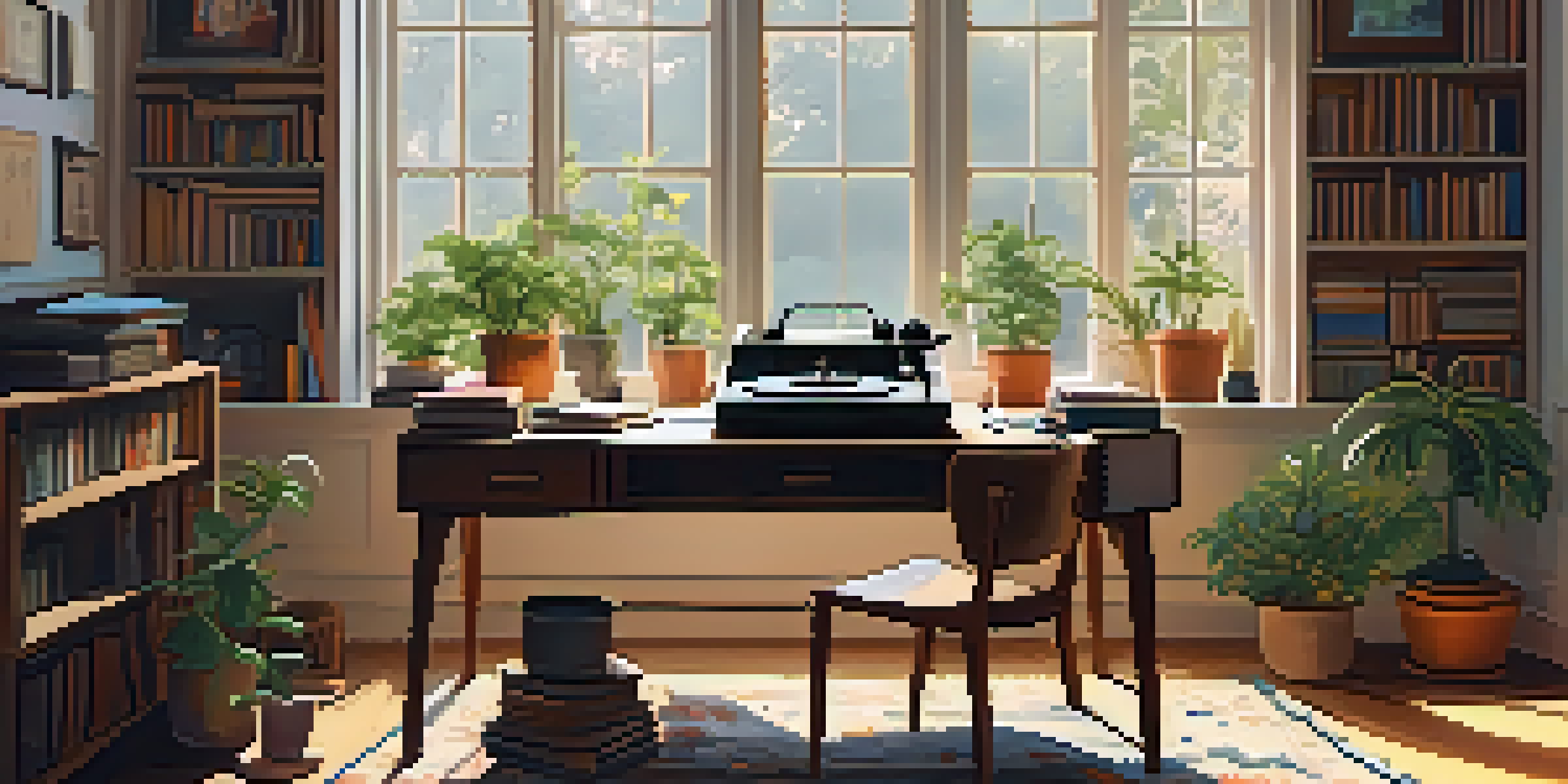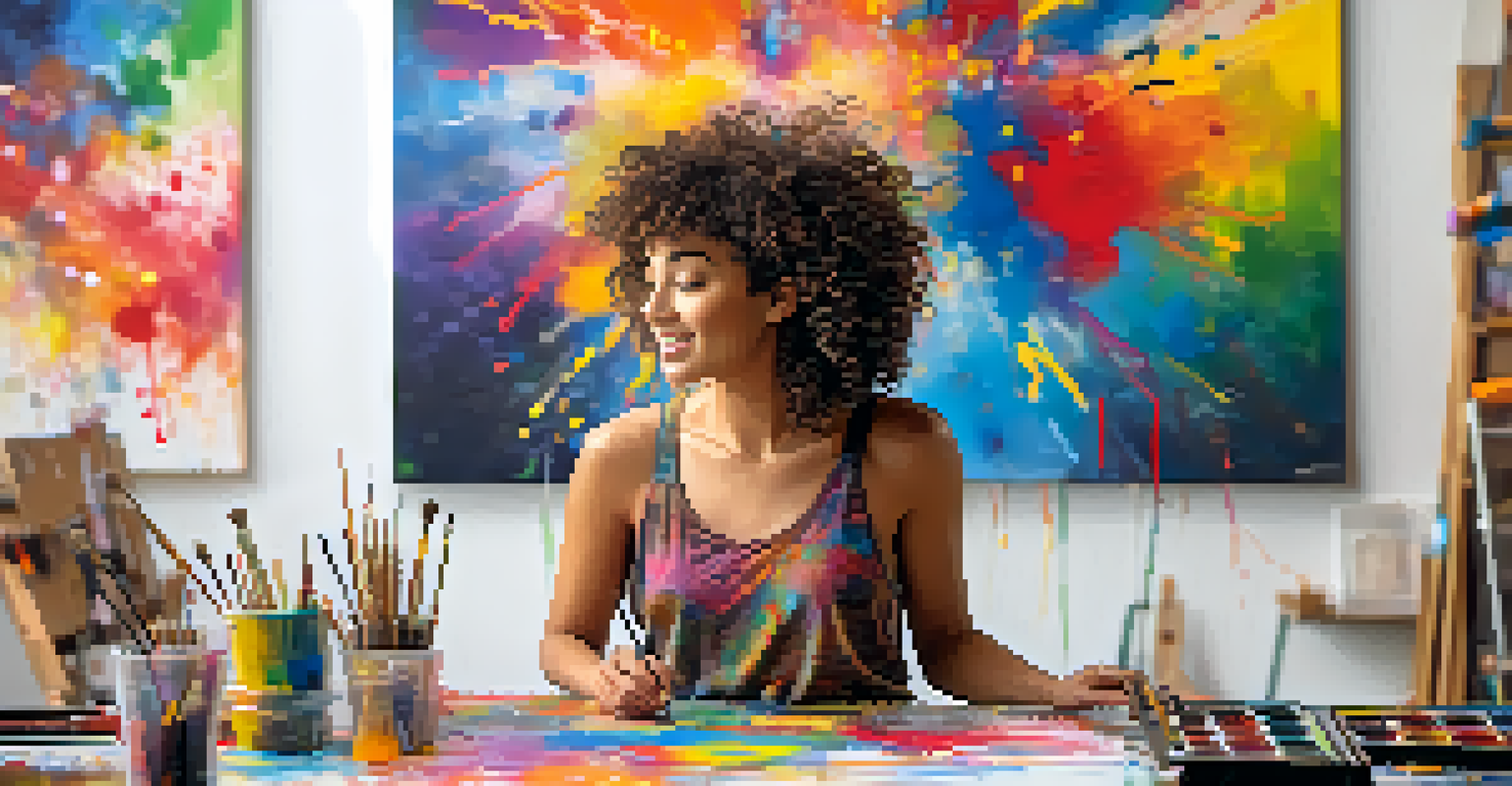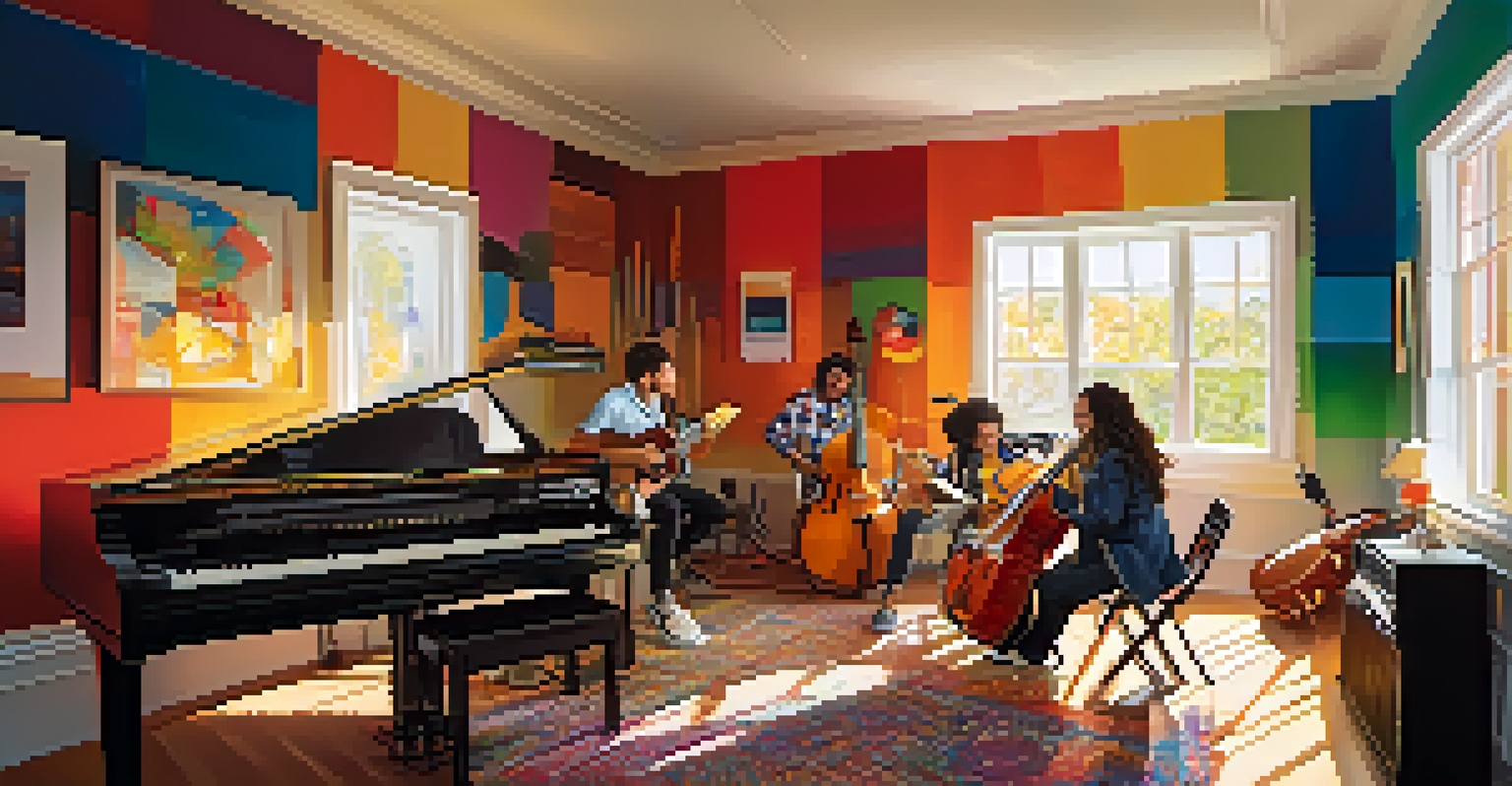The Connection Between Music and Creativity in the Brain

How Music Stimulates Brain Activity
Music has a unique ability to engage multiple areas of the brain. When we listen to music, our brain lights up in areas responsible for emotion, memory, and even motor skills. This widespread activation suggests that music isn’t just an auditory experience; it’s a complex cognitive event. For example, studies show that musicians often have enhanced connectivity in brain regions linked to creativity and problem-solving.
Music can change the world because it can change people.
Interestingly, the type of music we listen to can influence our brain's responsiveness. Upbeat tunes might pump up our mood, while classical music often fosters a more reflective state. This variability in brain response highlights how music can be tailored to enhance specific creative tasks. Think of it as choosing the right tool for a job; the right music can set the perfect atmosphere for innovation.
Moreover, engaging with music—whether by playing an instrument or singing—has been shown to improve brain plasticity. This means that our brains become more adaptable and better at forming new connections. Such flexibility is essential for creative thinking, allowing us to combine ideas in novel ways and solve problems more effectively.
The Role of Rhythm in Creative Expression
Rhythm plays a crucial role in how we perceive and create music, and it also affects our creative output. The steady beat of music can enhance our ability to focus and enter a 'flow' state, where creativity flourishes. This rhythmic stimulation can be likened to a metronome, guiding our thoughts and actions into a synchronized pattern that boosts productivity.

Research indicates that engaging with rhythmic music can lead to improved cognitive functions, such as attention and memory. For instance, a study found that participants performed better on creative tasks after listening to rhythmic music compared to silence. This suggests that rhythm not only energizes us but also sharpens our mental acuity, making it easier to generate ideas.
Music Engages Multiple Brain Areas
Listening to music activates regions linked to emotion, memory, and creativity, enhancing cognitive function.
Additionally, rhythm can evoke emotions that inspire creativity. Just as dancers move to the beat, our brains respond to the rhythmic structure of music, triggering emotional reactions that fuel imaginative thinking. This emotional connection serves as a catalyst, often leading to unexpected bursts of creativity.
Music Genres and Their Creative Impacts
Different genres of music can evoke distinct emotional and cognitive responses, impacting our creativity in varied ways. For example, classical music is often associated with concentration and deep thinking, making it a popular choice for studying or brainstorming. On the other hand, genres like jazz or rock might spark spontaneity and innovative thinking, encouraging us to break free from conventional patterns.
Without music, life would be a mistake.
Furthermore, personal preference plays a significant role in how music affects our creativity. What inspires one person may distract another. This individuality means that finding the right genre for your creative process can be a personal journey, akin to discovering your unique creative voice.
Interestingly, the fusion of genres can also lead to heightened creativity. When artists blend styles, they often create something entirely new, which can inspire listeners to think outside the box. This cross-pollination of musical genres serves as a reminder of the limitless possibilities that emerge when we embrace diversity in our creative endeavors.
Music's Effect on Mood and Creative Thinking
Our mood significantly influences our creative capacity, and music is a powerful tool for mood regulation. Listening to music we love can elevate our spirits, making us more open to new ideas and perspectives. This emotional uplift can act like a mental reset, clearing away blocks that hinder creativity and allowing fresh thoughts to flow.
Conversely, music can also evoke nostalgia or sadness, which can be equally powerful for creativity. Many artists have drawn inspiration from their emotional experiences, using music as a backdrop to express complex feelings. This illustrates how both positive and negative moods can fuel creativity, serving as different pathways to innovation.
Rhythm Enhances Creative Flow
The steady beat of music helps individuals enter a 'flow' state, boosting focus and idea generation.
Additionally, the right music can reduce stress and anxiety, creating a mental space where creativity can thrive. When our minds are at ease, we’re more likely to take risks and explore uncharted territories in our thinking. Thus, music acts as both a motivator and a healer in the creative process.
The Science Behind Music and Creativity
Scientific research continues to uncover the intricate relationship between music and creativity, revealing fascinating insights into our brain’s inner workings. Neuroimaging studies have shown that engaging with music activates the brain's reward system, releasing dopamine—the feel-good neurotransmitter. This release not only makes us feel good but also encourages exploration and creative thinking.
Moreover, the concept of 'divergent thinking'—the ability to generate multiple solutions to a problem—is often enhanced by musical engagement. Studies suggest that musicians tend to score higher on divergent thinking tests, indicating that their brain's creative pathways are more readily activated. This suggests that regular interaction with music can cultivate a mindset that embraces creative possibilities.
The implications of these findings are profound, suggesting that music training could be beneficial beyond artistic realms, aiding innovation in fields like science and technology. By fostering creativity through music, we can empower individuals to approach challenges with fresh perspectives, ultimately enriching various sectors of society.
Creating a Musical Environment for Creativity
To harness the power of music for creativity, it’s essential to curate an environment that fosters inspiration. This could mean creating playlists tailored to specific tasks or moods, ensuring that the music serves as a catalyst rather than a distraction. Consider experimenting with different genres and tempos to find what resonates best with your creative process.
Additionally, incorporating music into daily routines can enhance the overall creative experience. Whether it’s listening while working, exercising, or even during downtime, integrating music into various aspects of life can stimulate the brain’s creative faculties. Think of it as a soundtrack to your life, setting the tone for each moment.
Genres Influence Mood and Creativity
Different music genres evoke unique emotional responses, impacting how individuals approach creative tasks.
Lastly, don’t forget the power of collaboration through music. Participating in group jam sessions or collaborative projects can spark new ideas and foster a sense of community. This collective engagement not only enhances individual creativity but also builds connections that can lead to innovative outcomes.
Personal Stories of Music and Creativity
Many artists and innovators have shared personal anecdotes highlighting the role of music in their creative journeys. For instance, renowned composer Ludwig van Beethoven often turned to music to express his emotions, even as he faced challenges with his hearing. His story illustrates how music can be a lifeline for creativity, transcending obstacles and inspiring profound artistic expression.
Similarly, contemporary creators like writers and filmmakers frequently cite music as a source of inspiration. Many report that listening to specific tracks while working helps them visualize scenes or develop characters. These personal stories emphasize the subjective nature of the music-creativity connection, showcasing how individuals tap into music's power in unique ways.

These anecdotes serve as a testament to the universal truth that music and creativity are intertwined. Whether through personal struggles or collaborative efforts, the stories of individuals remind us that music is not just an art form but a vital element of the human experience, fueling creativity in countless ways.